#monasticism
Text
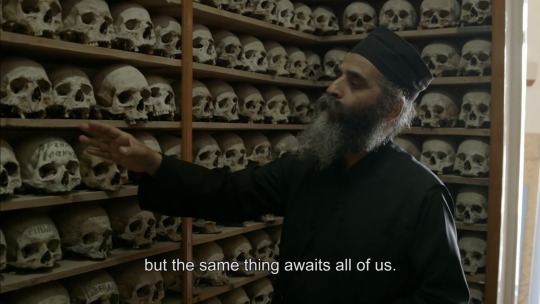
#orthodox christianity#eastern orthodox#eastern orthodoxy#orthodox#orthodoxy#christianity#greek orthodox#monasticism#monastic life#mount athos#holy mountain
2K notes
·
View notes
Text
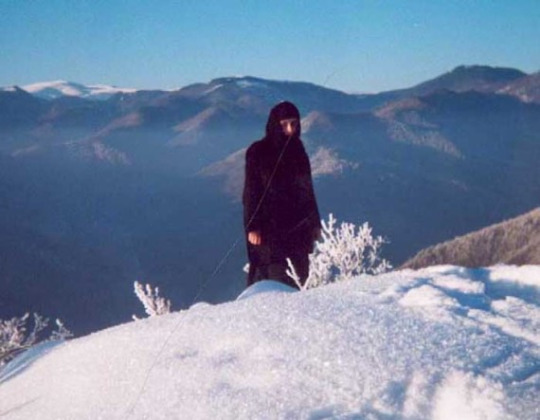

An isolated nun in Romania (x)
4K notes
·
View notes
Text
264 notes
·
View notes
Text
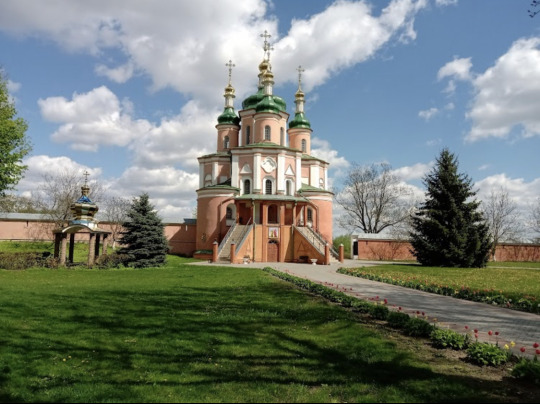
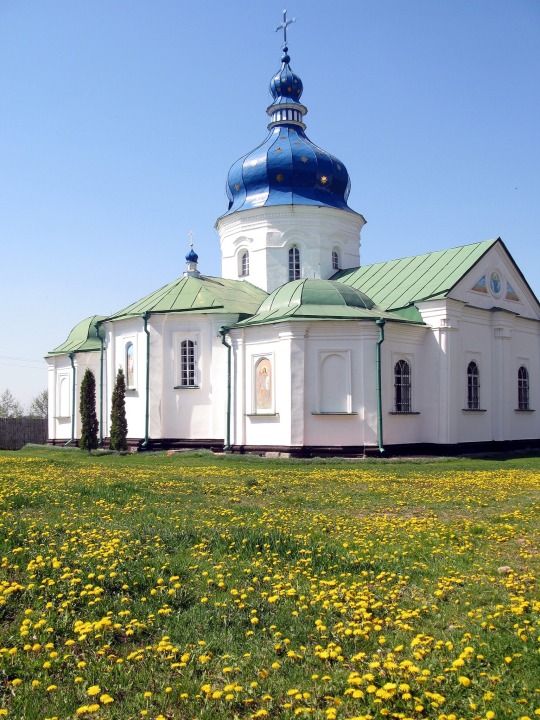
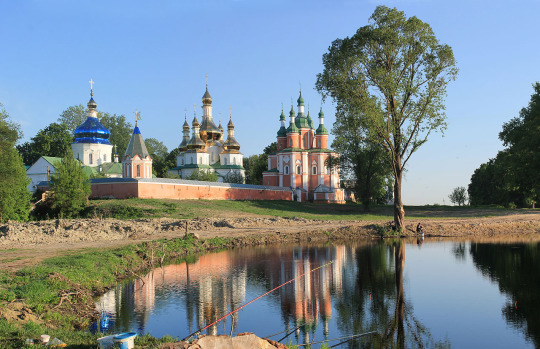
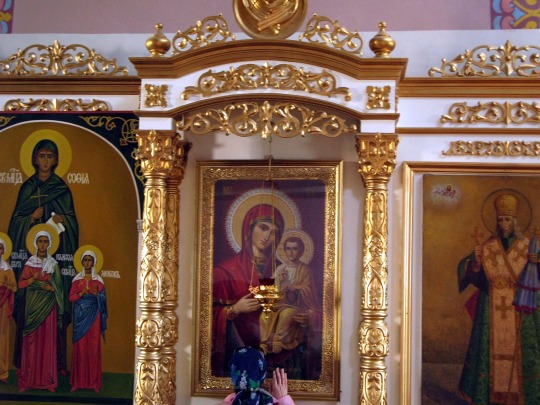
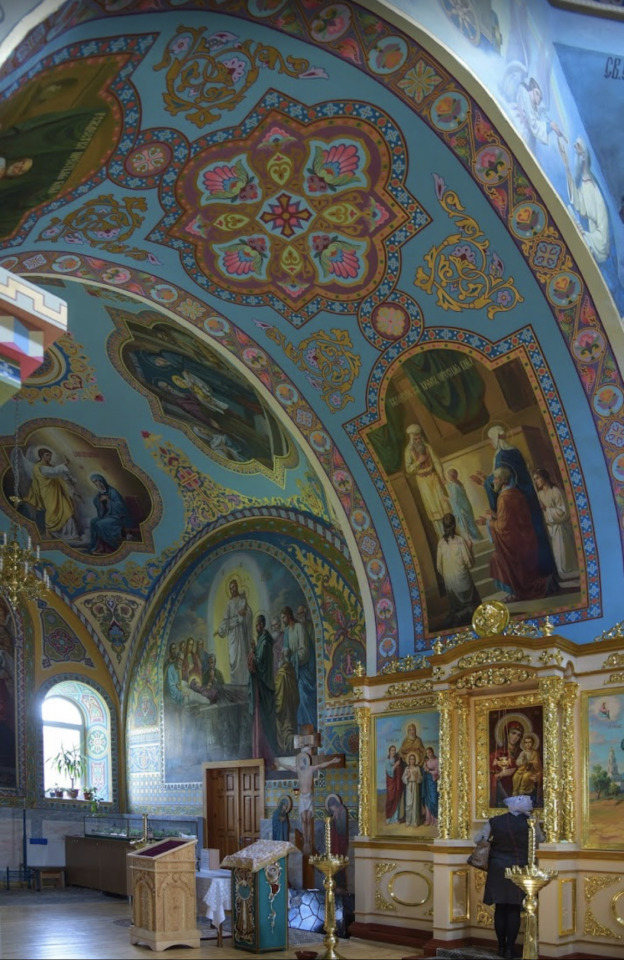
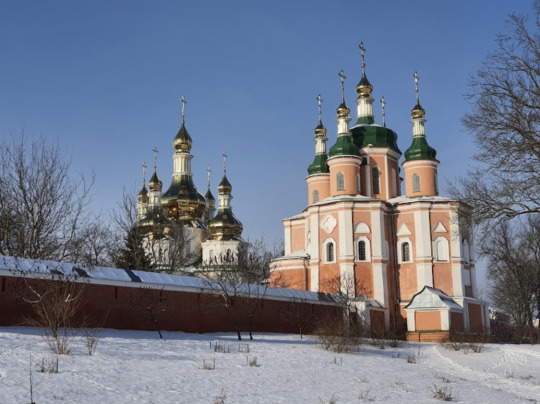
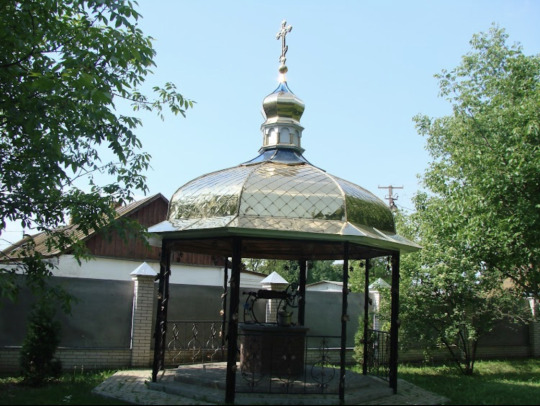

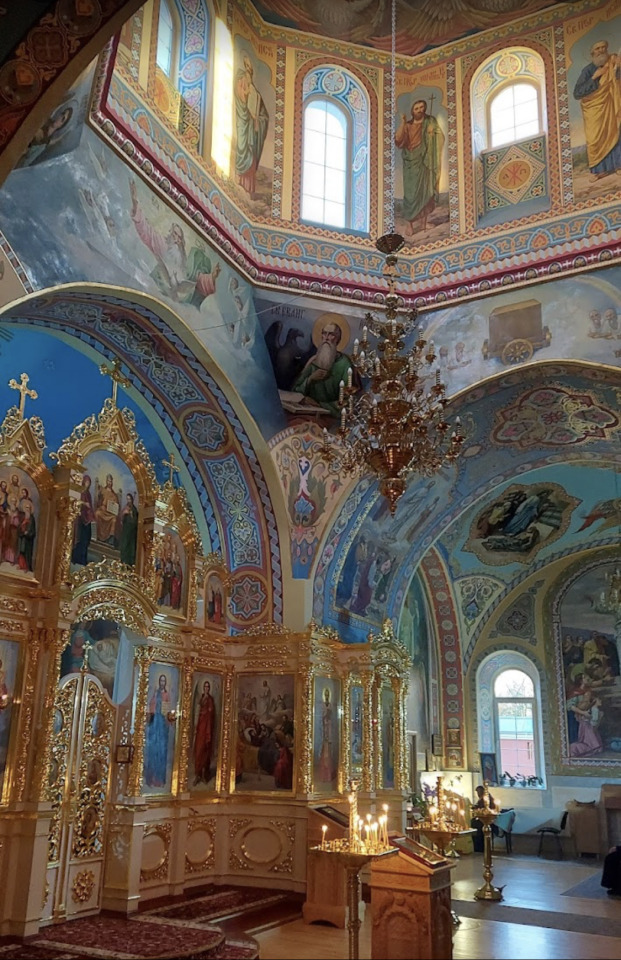
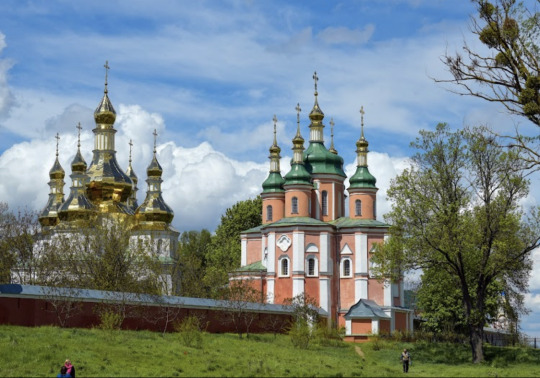
Hustynsky Holy Trinity, an Eastern Orthodox church and convent in Hustinya, Chernihiv, Ukraine. It is an example of the Ukrainian Baroque style of architecture.
#my post#ukraine#eastern orthodoxy#monasticism#chernihiv#україна#чернігівська#convent#orthodox christian#orthodox christianity#ukrainian#baroque
221 notes
·
View notes
Text
Favorite description of vowed religious life is now "Yeah, I've put all my eggs in the 'I'm Weird for Jesus' basket"
61 notes
·
View notes
Text
Deccis, Agon, Ayumi, and Marcian. From June 2023
#rosariumoccultum#original character#worldbuilding#dnd#dungeons and dragons#d&d 5e#cult#monasticism#monks#dnd cleric#perfect loop#pixel art#2d animation#animation#procreate animation#medieval#medieval fantasy#medieval character#cleric#jester#necromancer#animation meme#medieval manuscripts
71 notes
·
View notes
Text



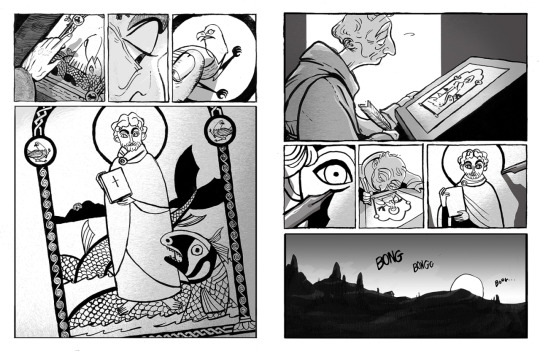

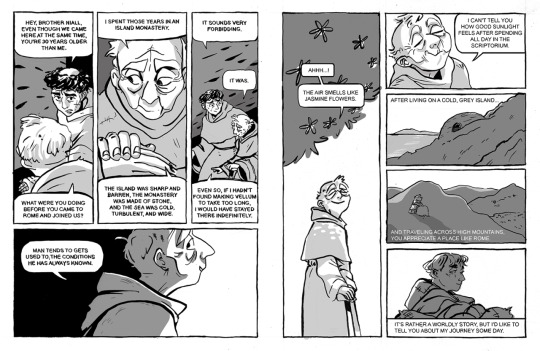
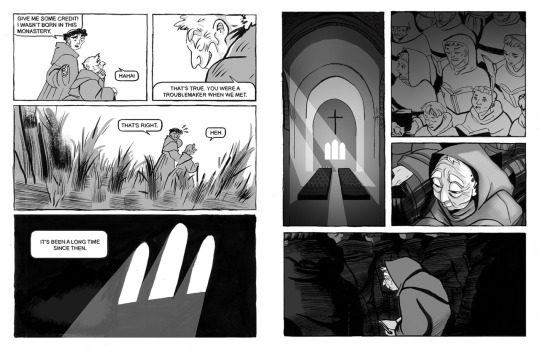

This is my senior thesis from all the way back in college! It's about a 12th century monk who is forced to travel from the Skellig Islands to Rome when his monastery is abandoned. I'd love to revisit it with everything I've learned since then.
#original work#skellig michael#comics#illustration#monasticism#monks#I DID THIS WITH DIP PEN AND LOOSE BRUSHES!!! insane#i was quite literally insane#Slimemanagement
41 notes
·
View notes
Text
24 notes
·
View notes
Text
I'm not even remotely religious in any way, but I am begging people who are going to write about a character going into a monastery/nunnery whatever to please, please, please read some of the Cadfael Chronicles before you cast an entire population of people as fire-and-brimstone, self-mutilating, repressed, fanatical zealots.
For the uninitiated, the Cadfael Chronicles was a long series of medieval-set (specifically set in the 12th century) murder mysteries where the gumshoe role is taken by a monk who is well into middle age, a skilled herbalist and a former soldier and sailor who joined the Order late in his life (which for one, did happen!).
Now, there are some dated things about the writing that bears some examining; Ellis Peters (psued for Edith Pargeter) first started writing then in the late seventies (the last book was published 1994, a year before her death), and while she was a fantastic amateur self-taught scholar (she was so good she got an honorary degree from Birmingham University, having never even been to any higher education than high school) she is writing about the time of the Crusades and the Crusaders who invaded Jerusalem and she doesn't really delve that deep into the implications of her characters being involved in that, even though the characters are portrayed as the good guys, especially the titular one. But it's very possible most of the scholarship she had available for research at the time was all Western perspectives, which, you know, history is written by the winners, etc. She has a writers bias towards her protagonist, so of course he is framed fairly glowingly, though not without flaw.
But whether she had a view on the moral implications of the Crusades or not, the way she wrote medieval Britain and medieval Wales is absolutely textually fascinating because she doesn't flinch away from the fact that yes, Britain at this time was a feudal serfdom with slaves included, and was hard on marginalized people, chock full of patriarchy that did affect the lives of her female characters or that the Church was a big landowner themselves, and there was plenty of political tension and violence due to an ongoing civil war, but nonetheless the town the Chronicles are set in and the monastery where Cadfael lives is portrayed as a community.
Seriously. They don't just pray and whip themselves for 'bad thoughts'. The monks can be funny, snarky, and shy, and ambitious. They can be irreverent - yes, even about God, that thing that they are meant to be the most reverent about. They can have petty rivalries, they can annoy one another, even the Abbot, and not be sent for a backbreaking penance. They aren't thumping on bibles and telling people that if they don't make the cut that they're going to burn in hell.
They care. They take care of the children left in their charge, whether they're rich scions there to get an education or some poor thing left on their doorstep. One monk, in charge of the children, expresses real and genuine concern over a new novice that is having horrific dreams, worried that he has suffered a tremendous hidden trauma (he's right) and they're all concerned about what they can do to help him. A pair of teenagers literally fuck on one of the altars and the reaction from Cadfael is rueful amusement at young people's folly, not disgust or anger. They collect alms for the poor, redistribute everything given to them to help people survive. They crack jokes and show each other kindness and...
... look, I'm not saying that there weren't and still aren't zealots in religion. No religion is really innocent of that. And yeah, those zealots have done some pretty heinous things when they're put in charge - see Witch Burnings, Various Inquisitions, Crusades, Terrorism, etc. But I do wish writers wouldn't write about religious life like everyone who ever entered it was either a complete bag of bible-thumping assholes or just miserable all the time.
For one thing, that's really boring. Religion is a way we can tell stories about the complex reality we live in and the rules we think are important when dealing with other people. To reduce all that potential down to Miserable, Repressed, Self-Harming, Witch Hunting Jerks is intellectually lazy at best.
For another thing, you are losing the opportunity to portray a fundamentally queer experience. I don't mean they were all fucking (although some of the proscriptions that they felt the need to write down would rise your eyebrows - hand holding was apparently banned at one point); I meant that this was a group of people that took themselves out of the amatonormative status quo entirely and dedicated themselves to something that wasn't marriage, children, mercantile endeavors or anything 'normal' like that. That was, at the very least, a queer experience with clear queerplatonic overtones (not to mention, there were FTM trans monks that literally went on to sainthood, chosen gender kept intact).
And also? It just isn't historically accurate. Plenty of men and women actively chose a life outside the norm because they wanted to serve god and the community. They're just a group of people, all living together, making space for one another, all trying to serve people in whatever way they can. These people were less raging witch-burners and more Jedi without the lightsaber.
In the Cadfael books, they have brushes with zealots and they're reviled as bad guys every time. One (in the very first book) more or less fakes a whole-ass vision to manipulate the order to go to Wales and try and acquire a Welsh saint's bones and ends up doing even worse things because he believes he is destined for greatness and will get it by whatever means necessary. The head of the mission (who edges close to zealot territory himself and fully buys into the con for his own benefit) tries to buy the saints relics and causes a massive diplomatic incident as a result of this insult that makes him look like an idiot.
The other zealot that gives them trouble is a priest appointed to run the church. This man is as big a bible thumping, hellfire and brimstone dickhead as you might always picture a medieval priest to be and he is uniformly despised by both the monks and the township at large because his zealotry and strict adherence to only the letter of religious law and nothing else actively harms the community.
He's so hated, in fact, that when he (spoilers) dies, the reactions of all and sundry is mostly just relief that he's gone.
The Catholic Church has a lot of sins that it forgets more than it reckons with, but that doesn't mean that life in a monastery was all hair shirts and self-mortification, every abbot a little dictator. People have lived just fine in small communes for a lot of human history and they didn't all have small-minded tyrants continually cracking the whip. Most of them didn't.
I know it's an easy shaft to mine angst from, shoving people into an oppressive environment that they must either endure or overcome. And yes, the way we write about religion is sometimes a product of working through a complicated and traumatic relationship with it. I'm not trying to say any writer can't or shouldn't write that because your art is always supposed to be about putting parts of yourself out there, about telling the world a story about how you see it; and if you're working through something, if you need to tell a story about the scars that zealotry absolutely have and do leave, go for it, more power to you. That's a story that should and must be told.
But if your character is going into a monastery, try to remember that humans are social creatures. We make friends more than we make enemies. Even under intense tyranny, we make allegiances and form bonds and find ways to make the world were in a little bit more bearable wherever we can. And we tend to show each other compassion and mercy, even when we don't always like each other. It's true today, and it was true then too.
Monastic life was a queer experience that happened right under the noses of the dominant power structures for centuries. I think there's a story or two to be mined from that as well.
#writing#worldbuilding#character building#medieval history#religion#nicolo di genova#the old guard#brother cadfael#ellis peters#queerness#m#monasticism#monastic life
17 notes
·
View notes
Text
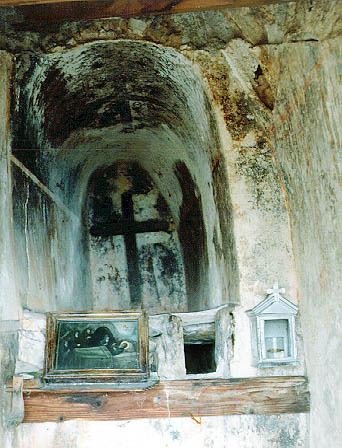

Monk Cells (x)
328 notes
·
View notes
Text
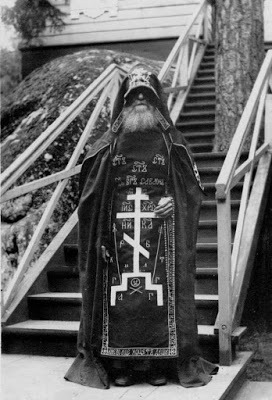
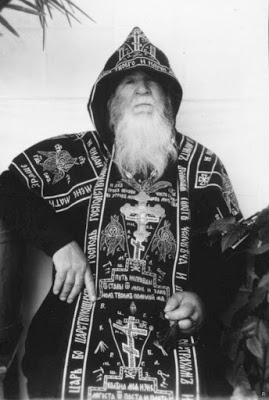
The Greek letters that appear on the analavos are abbreviations of phrases that extol the Cross as “the power of God” (I Corinthians 1:18).
From top to bottom:
• ΟΒΤΔ – Ό Βασιλεύς της Δόξης – “The King of Glory”
• ΙC XC NIKΑ – Ιησούς Χριστός νικά – ”Jesus Christ conquers”
• ΤΤΔΦ – Τετιμημένον τρόπαιον δαιμόνων φρίκη – “Honored trophy, the dread of demons”
• ΡΡΔΡ – Ρητορικοτέρα ρητόρων δακρύων ροή – “A flow of tears more eloquent than orators” (or, more likely: Ρητορικοτέρα ρημάτων δακρύων ροή)
• ΧΧΧΧ – Χριστός Χριστιανοίς Χαρίζει Χάριν – “Christ bestoweth Grace upon Christians”
• ΞΓΘΗ – Ξύλου γεύσις θάνατον ηγαγεν – “The tasting of the tree brought about death”
• CΞΖΕ – Σταυρού Ξύλω ζωήν εύρομεν – “Through the Tree of the Cross have we found life”
• ΕΕΕΕ – Ελένης εύρημα εύρηκεν Εδέμ – “The discovery of Helen hath uncovered Eden”
• ΦΧΦΠ – Φως Χριστού φαίνοι πάσι – “The light of Christ shines upon all”
• ΘΘΘΘ – Θεού Θέα Θείον Θαύμα – “The vision of God, a Divine wonder”
• ΤCΔΦ – Τύπον Σταυρού δαίμονες φρίττουσιν – “Demons dread the sign of the Cross”
• ΑΔΑΜ – Αδάμ – “Adam”
• ΤΚΠΓ – Τόπος Κρανίου Παράδεισος γέγονε – “The Place of the Skull hath become Paradise”
• ΞΖ – Ξύλον Ζωής – “Tree of life”
79 notes
·
View notes
Text



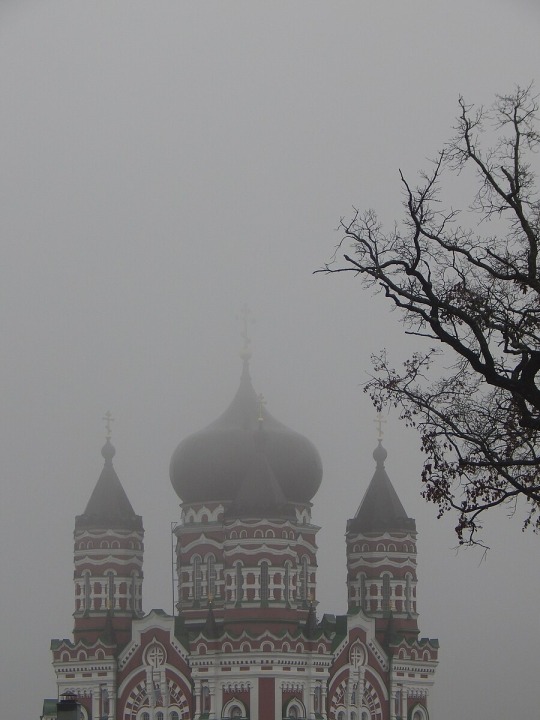
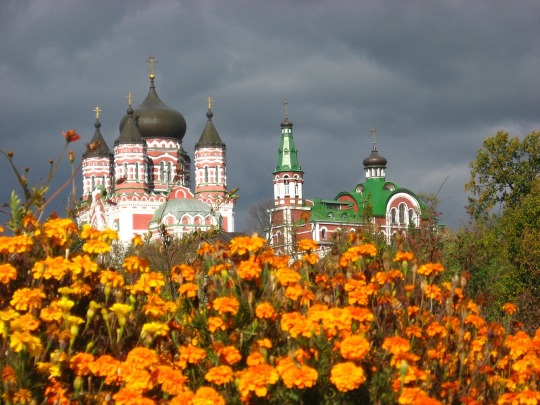

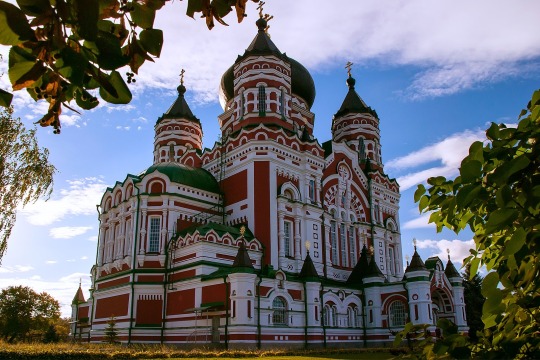
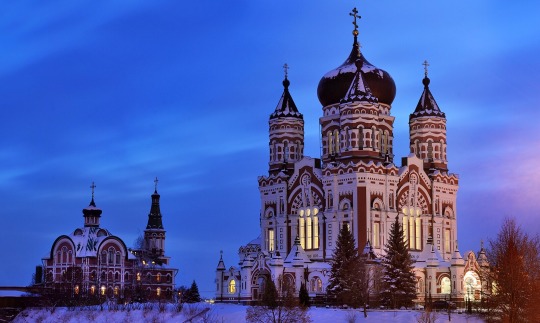
Photos of St. Panteleimon's Cathedral which is found close to Feofaniia in Kyiv, Ukraine.
The cathedral was looted during the Bolshevik revolution and then it was damaged WWII. In the 90’s, it was returned to the Ukrainian Orthodox Church and is now the church of a convent.
#my post#eastern orthodoxy#monasticism#convent#cathedral#orthodox christianity#ukraine#ukrainian#kyiv#nunnery#religious architecture
119 notes
·
View notes
Text
The Irregular Ascetic
In August, I briefly made a new friend on Tumblr.
His account has long since vanished for reasons I do not know. Maybe this place just didn't click for him. I've been here for years and always found it welcoming, but I know that, like everything, this site is not for everyone.
He'd send me a message, ask a question or two, and when I checked every week or so, I'd do my best to reply.
Then, one day, he was gone, but not before leaving me one last question:
"An ascetic heathen life? What does that look like to you? I want to see that visual."
And that's kind of the question, isn't it?
The thing about callings is that they aren't always clear-cut. I may feel drawn towards an ascetic heathen life, but it's not like my Gods sent me an Ikea flat-pack kit.
As seems to be the pattern with the Germanic deities, they tapped me on the shoulder and then said...
"Here ya go, figure it out."
And here we are. Forty-Two, with over ten years as a member of the Ár nDraíocht Féin (ADF), I haven't finished my dedicant path, nor started the clergy track.
I can't remember the last time I did a full ritual.
All in all, I seem like a pretty crappy monk, don't I?
Sister Snow Hare, indeed...
It seems that my vanishing friend pinned me to the wall. I've been chewing on this again, trying to work it out.
If you're reading this, buddy, know that you kicked off a lot of introspection about my path, and you inspired this long rambling Tumblr post.
The best place to start is the beginning. (A little free wisdom)
So, what exactly is monasticism?
Good ol’ Mr. Wikipedia defines it as "a religious way of life in which one renounces worldly pursuits to devote oneself fully to spiritual work."
No matter the faith, this is a feature of monastic life: asceticism, self-denial, and focus.
Have I mentioned I can't remember the last time I did a ritual yet?
Tsk. Tsk. Tsk.
Nothing makes me feel guilty, like comparing myself to the standards and practices of others. Somewhere out there, a Buddhist is living on four grains of rice, meditating eighteen hours a day, stopping only to sleep. The five minutes a day he spends on Tumblr, he's laughing at me.
I just know it. >.>
You could say I've been feeling a little convicted about this.
Yet the calling is still there. My relationship with my Gods isn't just good; it's warm. While not formal or official, I have a fulfilling spiritual life that's not structured like anything in the faith org I faithfully send my twenty dollars a year to and then largely hide from.
So what's going on?
I've begun to realize slowly over the last year that my faith path will probably never be recognizable as anything routine, rote, or by the book, but what it will be is mine.
Where does my asceticism show?
Let me take you through a typical day.
Waking at 2300 (11 pm), I plank for three minutes, do about ten minutes of calisthenics, wash my face, and then meditate for twenty minutes to a half hour, offering that time to the Gods. Then, with that done, I recite my creed and head off to the gym.
I have a creed. I'm that fancy!
While I'm in the truck, I informally pray. Often, I'm talking to my Lady Eostre, but the other Gods definitely get included. Woden and I have always gotten along, and Thunor, I call big brother because he's always watching out for us and protecting us.
Now it's time for my hour minimum at the gym. Half an hour each of cardio and weight training. This is so I can be in good condition and proper shape.
Good health is important to me, but more on that in a moment.
When I get home, I clean for about an hour, something I call "service meditation." Scrubbing floors, cleaning counters, and sanitizing bathrooms is a gift I can give daily to my loved ones with whom I make a home. While I work, I reflect on them and consider all they give me.
After a much-needed shower, I'm in the office and might finally have breakfast. I eat, ascetically, often the same thing every day; I keep my calories low and usually take up a 16-hour fast between my last meal and first meal.
Everything gets weighed down to the gram and tracked on my calorie sheet.
Next comes editing, writing, often some informal online counseling, or time spent on networks like Counter Social, Telegram, and Discord trying to help people, even if it's only getting them to smile.
Hope is big for me because my Lady Eostre is the goddess of Spring and the Dawn. She is hope personified, a goddess of fresh chances and potential. Pointing back to her and her values is my purpose. It's what I was made for.
My day continues like that until I'm in bed at 1600 (4 PM), after an hour cool-down where I go through my creed and have one last conversation with the Gods. That's when I set out my fruit offerings if I happened to have any that day.
It's a hard and fast rule. The gods always get the best part of the banana and the strawberry.
This is the way.
My bed is a mat that rolls out on the floor. I started that in 2020, and I've never been happier or slept better, and when I travel, it comes with me.
And I travel a lot.
My family here calls it "missions." Every now and again, someone in my network will need help. They might be having surgery, a mental health crisis, or are moving cross town or cross country. Whatever the reason, the call goes out, and if I can make it work with money, I'll hop a plane, train, or bus and get out there.
Beyond the joy I get from being in shape and capable, this is why I work out. It's much easier to load and move boxes or help lift people when you're in decent physical condition.
I actually have training as a CNA, so I know how to do all the transfer stuff, and I have decent experience in post-surgical care.
I don't want to go into this part too much because it feels like bragging, but I've been all over the States and soon to be Canada just helping people. I ramble in, do what I can, then return home and take back up my discarded routine.
And this is my life, apart from writing my books. As I looked at it and began breaking it down, I realized that I am already living a disciplined ascetic life.
My gods and my faith are at the forefront of what I do, but what defines my faith isn't the regular application of ritual, but action. Indeed, one of the sayings I live by is actions show what words claim.
So I'm not on a mountaintop, meditating with the sun's rising and setting, or dwelling within a monastery, cloistered from the world, living to sing hymns. There is beauty in that kind of asceticism, but it's not my asceticism.
Yet, we do have things in common.
My life is one of service, with a focus on the divine and the advancement of their aims for the world. It is my hope (there's that word again) that I can show the wisdom and cunning of Woden, the strength of Thunor, the honor of Tyr, and most of all, embody the hope of the Dawn in all I do.
Of course, I'm not perfect, and Saturdays are often waffle day, but life is about growth, not static metrics.
It's dawning on me that I may never be fully recognized in my path. I don't seem to jive well with organizations and dogmatic structures. I may never have Reverend by my name or "Sister" formally. When it's time to go, I may not even leave much behind save my books and these Tumblr posts.
When I do cross that far horizon, and I am again before my Lady, I hope she will look back on all I did during this strange human odyssey and see that while I may have been taken from her for a time, I never stopped being her devoted one, her servant, and that is all the formal recognition I will ever need.
For me, an ascetic heathen life is one of actions, denial, and service, which I seek to live every day.

#otherkin#therian#kinfriday#tumblr#writing#heathenry#neopaganism#germanic paganism#heathen asceticism#wandering hare#counter social#monasticism#paganism#anglo saxon pagan#the way of the wandering hare
23 notes
·
View notes
Text

Marcian and Vis. From November 2023
#rosariumoccultum#original character#dnd character#worldbuilding#dnd#dungeons and dragons#d&d 5e#cult#monasticism#pixel art#monk#necromancer#dnd art#medieval#medieval fantasy#medieval character#skeleton#macabre
60 notes
·
View notes
Text
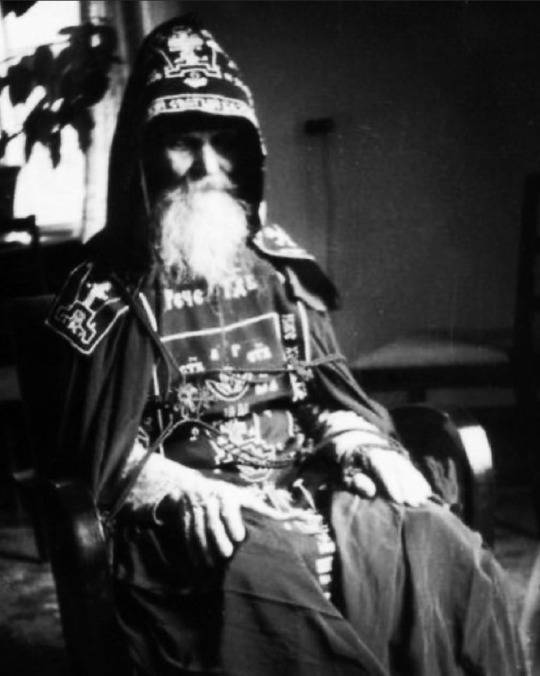
Elder Michael the Blind
#eastern orthodox#orthodox christianity#orthodox#great schema monk#monasticism#asceticism#ancient christianity
34 notes
·
View notes